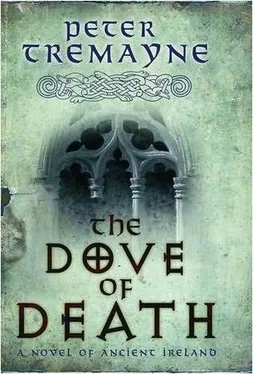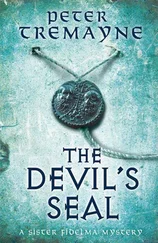Peter Tremayne - The Dove of Death
Здесь есть возможность читать онлайн «Peter Tremayne - The Dove of Death» весь текст электронной книги совершенно бесплатно (целиком полную версию без сокращений). В некоторых случаях можно слушать аудио, скачать через торрент в формате fb2 и присутствует краткое содержание. Жанр: Исторический детектив, на английском языке. Описание произведения, (предисловие) а так же отзывы посетителей доступны на портале библиотеки ЛибКат.
- Название:The Dove of Death
- Автор:
- Жанр:
- Год:неизвестен
- ISBN:нет данных
- Рейтинг книги:5 / 5. Голосов: 1
-
Избранное:Добавить в избранное
- Отзывы:
-
Ваша оценка:
- 100
- 1
- 2
- 3
- 4
- 5
The Dove of Death: краткое содержание, описание и аннотация
Предлагаем к чтению аннотацию, описание, краткое содержание или предисловие (зависит от того, что написал сам автор книги «The Dove of Death»). Если вы не нашли необходимую информацию о книге — напишите в комментариях, мы постараемся отыскать её.
The Dove of Death — читать онлайн бесплатно полную книгу (весь текст) целиком
Ниже представлен текст книги, разбитый по страницам. Система сохранения места последней прочитанной страницы, позволяет с удобством читать онлайн бесплатно книгу «The Dove of Death», без необходимости каждый раз заново искать на чём Вы остановились. Поставьте закладку, и сможете в любой момент перейти на страницу, на которой закончили чтение.
Интервал:
Закладка:
Iuna, who had emerged from the kitchens at the arrival of the Abbot, had been waiting discreetly in attendance. She now stepped forward.
‘I will ensure that instructions are so given, lady, for the Brother to be fed and provided with a bed while awaiting the Abbot’s pleasure. A bedchamber will be prepared for the Abbot as well.’
Abbot Maelcar absently glanced up at the girl and then, for a moment, his body sensed to tense. It seemed that only Fidelma noticed a strange expression cross his features. He composed himself quickly, however, before she could identify it, and turned back to the Queen.
‘There is no need to go to such trouble, lady. If we leave now, we can still return to the abbey by nightfall.’
‘Nonsense!’ Riwanon replied. ‘This mystery is too fascinating to let you return without its resolution.’
‘But,’ the Abbot protested, ‘if the messenger was sent to bring me on a fool’s errand, perhaps it was done for a purpose? Perhaps someone plans some mischief at the abbey in my absence?’
‘That is a good point,’ conceded Brother Metellus, speaking for the first time since the arrival of the Abbot. The latter scowled at him; he had obviously not forgotten the manner of their parting.
‘There are several warriors here,’ Fidelma pointed out. ‘Perhaps some of them could be sent to the abbey to warn the community and maintain a watch in case of anything untoward occurring?’
‘Excellent,’ approved Riwanon. ‘Then we shall relax and enjoy the fire and the food, which I am sure this generous fortress will provide, and Ceingar can indulge us by demonstrating her talents upon the harp. Let us relax and leave it to our good sister from Hibernia to fathom the mysteries of this day.’
She turned, waved Budic to come forward and proceeded to issue rapid instructions in her own language. After a few moments, the warrior hurried away. Riwanon looked round with satisfaction.
‘I have commanded two of my warriors to set out for the abbey in case of any problems. Budic will order the guards here to keep a careful watch on the roads in case my husband does decide to make a descent on this fortress — though, if I know him, he will be too intent on hunting his wild boar for a while yet.’
The Abbot sat down, but it was obvious that he was preoccupied. Riwanon had to repeat a question before he realised he was being addressed.
‘It is a few years since I visited the community of Gildas,’ she said. ‘My husband informs me that you have made some changes?’
The abbot looked at her blankly. ‘Changes?’
‘When I was there last, it was a conhospitae , in the old traditions of our people. Now I believe it is confined to males only and the Rule has been changed to that of the Roman religious Benedict. Is this so?’
The abbot frowned and his voice was defensive as he stated, ‘It is done with my authority, lady. In such matters I follow the Father of our Faith and his Curia.’
‘I would not question your authority, Maelcar. Once elected by your brethren, then you may run your community as you will — for as long as you have their support.’ Riwanon seemed to smile mischievously.
Abbot Maelcar flushed in annoyance. The old system, which was also part of the tradition of Fidelma’s land, was that abbots and bishops, like chieftains, were elected by their communities. They were constrained by an adherence to the laws to promote the welfare of their people. If they did not, they lost office. Obviously, Maelcar had been appointed Abbot by this method, but now it seemed he was imposing his own pro-Roman views on his community. Fidelma saw that Riwanon did not approve of it.
‘If only males are allowed at your community now,’ went on Riwanon, ‘I was wondering what had happened to those women and their children who were part of that community?’
‘They have gone safely to form their own communities,’ the Abbot replied stiffly.
‘I recall the kindness of Sister Aourken when I was small and was brought to the abbey by my father,’ Riwanon murmured, speaking almost to herself. ‘I wonder what became of her?’
‘Aourken?’ Fidelma repeated. ‘I can report that she is well. She gave us hospitality when we came to Gildas, for the abbey could not provide it.’
‘No women are allowed to stay within our community,’ snapped Abbot Maelcar, as if his hospitality was being questioned.
Riwanon gazed sadly at him.
‘Then times have changed, indeed,’ she sighed, before turning to Fidelma. ‘I am glad to hear that Aourken thrives. I must make a point of visiting her before I leave this area. So come, sister, let us draw closer to the fire and you may tell me what you know of the kindly Aourken.’
It was clear that Abbot Maelcar was not regarded highly by the Queen, and Fidelma could not condemn her for it. He was all the things that she held in contempt in a man of rank and one who proclaimed the Faith.
Riwanon’s female attendant Ceingar had reappeared and removed herself to a corner of the hall with Budic, and the pair were chatting gaily away, with now and then a peal of merry laughter. As Fidelma and Riwanon drew apart to talk pleasantly of various matters, Fidelma noticed that, while Eadulf and Brother Metellus sat with Abbot Maelcar as good manners dictated, their conversation was mainly with one another. However, the Abbot seemed to exclude himself and merely sat with a frown contemplating the space before him.
Once when Iuna entered to announce the readiness of the evening meal, Fidelma noticed the Abbot once more staring at the young woman with a curious look. When she returned to the kitchens, he rose and, muttering something about the privy, disappeared. Curiosity seized Fidelma as she noticed this and while Riwanon turned to speak to Eadulf, she rose and moved to the door and stealthily went through it. Along a darkened corridor she could hear raised voices. There was no mistaking the Abbot’s heavy growl and the higher-pitched indignation of Iuna. Fidelma strained to hear what they were arguing about, but when the voices lowered she returned quickly to rejoin the others. A moment later, Abbot Maelcar returned, clearly upset and in an ill temper.
The evening passed without further incident, until Eadulf raised the question that had begun to worry him since darkness had descended across the fortress.
‘Is it not strange that Macliau and Argantken have not returned from their hunting expedition? He said they would be back by evening.’
Brother Metellus rose from his place.
‘Forgive me, lady,’ he said to Riwanon. ‘I will go to the gate and see if there is news of him.’
He was gone for a while and when he returned and resumed his seat, the others looked at him expectantly.
‘Boric, who now commands the guard, tells me that they are not unduly worried,’ he said. ‘Macliau and Argantken left with four men, including his chief huntsman. Boric tells me that Macliau often does not return from the hunt until he has something worthy of returning with — and frequently stays out all night.’
Riwanon was frowning slightly. ‘Boric? I thought Bleidbara was in command of the warriors at this fortress?’
‘Bleidbara has gone as escort to Trifina, lady,’ offered Iuna, who was attending them at the table. ‘They have not returned yet. Perhaps they will not. Trifina often spends more time on the island of Govihan than in this fortress.’
Budic grinned, his expression full of some cynicism, which seemed to be habitual with him.
‘It is a peculiar household where all the hosts vanish and no one is left to offer hospitality save the servants. Who is Argantken, by the way?’
‘Just a local girl,’ muttered Iuna resentfully.
This seemed to amuse Budic even more, but a sharp glance from Riwanon caused him to compose his features.
Читать дальшеИнтервал:
Закладка:
Похожие книги на «The Dove of Death»
Представляем Вашему вниманию похожие книги на «The Dove of Death» списком для выбора. Мы отобрали схожую по названию и смыслу литературу в надежде предоставить читателям больше вариантов отыскать новые, интересные, ещё непрочитанные произведения.
Обсуждение, отзывы о книге «The Dove of Death» и просто собственные мнения читателей. Оставьте ваши комментарии, напишите, что Вы думаете о произведении, его смысле или главных героях. Укажите что конкретно понравилось, а что нет, и почему Вы так считаете.











